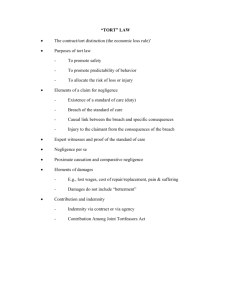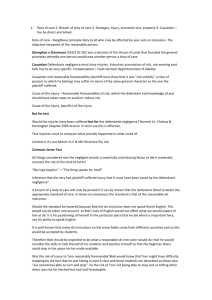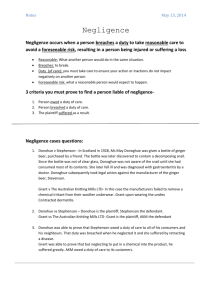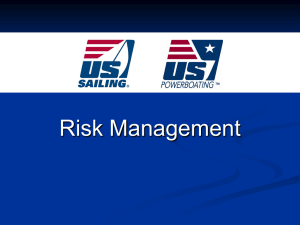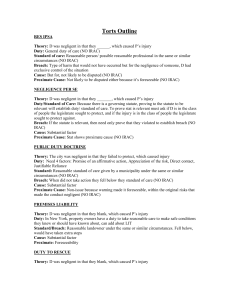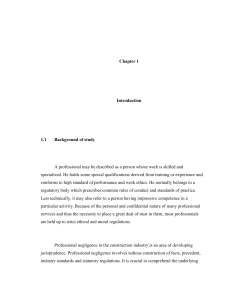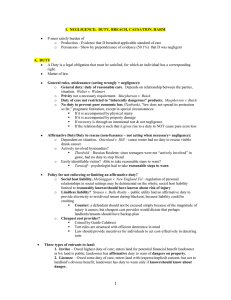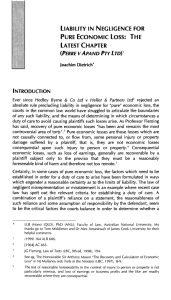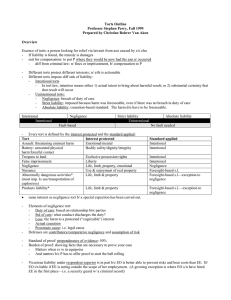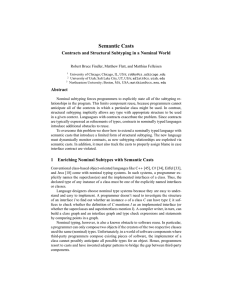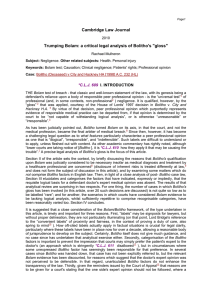Negligence
advertisement
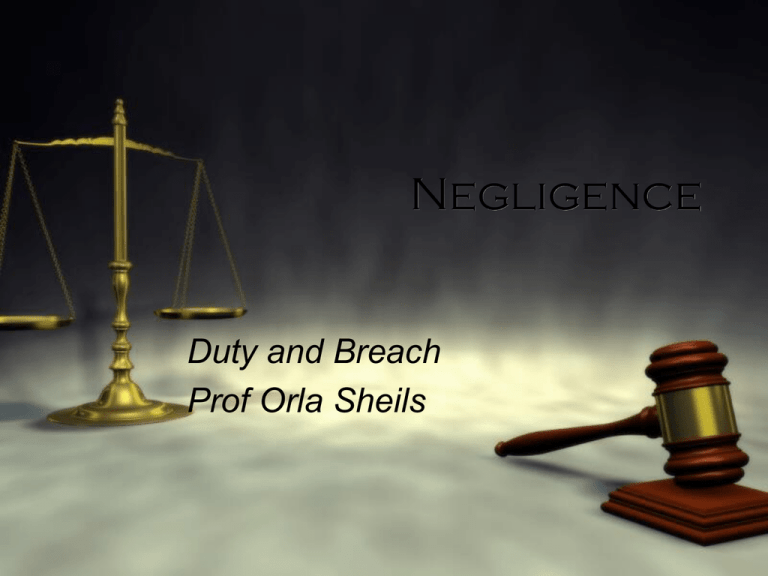
Negligence Duty and Breach Prof Orla Sheils Duty - Background 3 types of action may be brought: Contract Negligence Product Liability To maintain a claim in negligence the claimant must establish: A duty of care was owed to him The duty was breached He suffered injury/harm The breach caused the harm Definition Failure to satisfy the duty of care owed to a patient so that reasonably foreseeable damage results to the patient. Barnett v Chelsea and Kensington Hospital Management Committee [1969]1QB 428, [1968]1All ER 1068(QBD) CHILDREN: Request must come form a responsible adult (typically parent – could be a local authority). The request must be made by someone with legal authority to act on the child’s behalf to bring the doctor:patient relationship into existence. Thus the doctor gives an undertaking to the parent/agent but the LEGAL DUTY OF CARE is owed to the child. Incompetent Adults: Unconscious or mentally impaired. In law nobody is authorised to consent for such a person. Re F (mental patient: sterilisation) [1990]2AC1 – was the first authority by court recognising the principle of necessity in the patient’s best interests. Cf Lord Goff – having intervened the doctor will owe a duty of care. In such cases the doctor’s undertaking suffices for the common law. Brandon LJ- more fully states the case for the unconscious patient. Institutional liability Vicarious Liability Under common law the employer is vicariously liable for the torts of its employees. Points that need to be established: Has the individual committed a tort? Is he/she an employee of the institution? Did he/she commit the tort in the course of his/her employment? PRIMARY OR DIRECT LIABILITY In addition to vicarious liability the hospital may be liable for breach of duty owed directly to the patient. NEGLIGENCE BREACH Reasonableness The best test for negligence is whether the defs conduct was reasonable in the circumstances of the case. Standard is not necessarily determined by the average conduct of people. No matter how competent the defs conduct was on average, he is responsible for damage caused by a single lapse below the standard of reasonable care. Bolam v Friern Hosp Management Cttee [1957]2 All ER 118. Test is of the ordinary skilled man in exercising and professing to have that special skill. Duty to inform: Siddaway –v- Board of Governors of Bethlam Royal Hospital and the Maudsley Hospital Rogers -v- Whittaker 1992 from Australia SEE ALSO CHESTER v AFSHAR 2004- in Negligence –Causation. Moving from Bolam In general the fact that a doctor acted in keeping with common practice is others is strong evidence he has not acted negligently BUT moving away from Bolam the Courts have decided that this is not conclusive and the FINAL arbiter of a reasonable act is the COURT. Bolitho v City and Hackney HA [1993]4MedLR 381. IRISH CONTEXT Case: Dunne –v- NMH 1989, Finlay, Chief Justice Fitzpatrick vs White 2007 IESC 51 Foreseeability of Risk If danger could not reasonably be anticipated – def did not act negligently Roe v Min of health- defs not liable for adverse reactions to contaminated anaesthetic. Magnitude of Risk A degree of care commensurate with the risk created by the defs conduct is required. Magnitude of risk has 2 components: likelihood the harm will occur severity of potential damage Specialists and Inexperienced Emergencies Further Reading Williams- Medical Samaritans: Is there a duty to treat? (2001)21 Ox. Legal Studies 393 (Lexis) Williams - Are Doctors Good Samaritans? (2004) 71 Medico Legal Journal 165 (Lexis)


